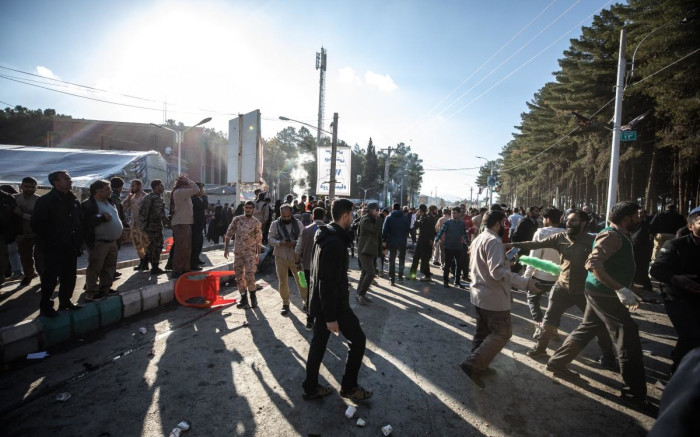
At 7 a.m., lines of customers snake down the block outside shops on the main shopping street in Musina, a busy South African border town where thousands of people from neighboring Zimbabwe arrive daily to buy food, clothing and other necessities hard to get back home.
A few miles away, at the border, pickup trucks bearing the seal of the newly formed South African Border Patrol inspect the barbed wire fence and try to arrest people crossing the border illegally – braving bandits, crocodiles and the rushing Limpopo River. The border force represents an attempt by the government to respond to popular demand and crack down on migrants sneaking into the country months before crucial national elections.
Musina, surrounded by farms and a copper mine, is where the government’s forceful immigration policies collide with a delicate reality that many South Africans are reluctant to admit: that even people crossing the border illegally can be good for the country.
Without them, “Musina will be a big ghost town,” said Jan-Pierre Vivier, a South African who owns a butcher shop with his family that relies on migrant customers.
Like politicians in the United States, Europe and elsewhere who score points with promises of tightened borders and mass deportations, their South African counterparts are embarking on a sweeping crackdown on foreigners to lure voters, tapping into similar, often unfounded fears that immigrants cause crime fuel stealing jobs.
South Africa has its own problems with poverty and extreme inequality but is wealthy compared to some of its neighbors, making it a tempting destination for migrants from Africa and beyond.
Last month, the South African government proposed the most sweeping overhaul of its immigration laws since the founding of democracy in 1994, aiming to severely restrict the entry of foreigners. In October, President Cyril Ramaphosa officially launched The new border agency will coordinate police, military and financial operations and said an increase in illegal migration has “exacerbated many of the country’s social and economic problems.”
To show how tough the new border agency has been, its head said earlier this month that it had prevented 443 Zimbabwean children traveling on 42 buses without their parents from being “smuggled” into South Africa at the border post near Musina .
Zimbabwean officials quickly dismissed the claim as fiction, saying they had no record of South African authorities handing over so many children. Zimbabweans living in South Africa said even when busloads of children were stopped, they were not victims of human trafficking but were instead coming to South Africa to visit their parents over the holidays, a typical practice.
“Everything goes back, we go to elections,” said Yona Zhoya, a native of Zimbabwe who lives in South Africa and works with immigrants. “As soon as you say, ‘Down with the foreigners,’ you get miles or their votes.”
As violence against immigrants increased in parts of South Africa, Mr. Zhoya said many migrants were fearful of sending valuables back to their home countries because they feared their homes would be attacked.
A survey showed that last year 69 percent of South Africans believed immigrants increased crime.
But in Musina, locals tend to look the other way when Zimbabweans wade across the Limpopo, sneak through holes in the border fence or grease the palm of a security guard.
Business owners in Musina don’t feel like they’re competing with foreign migrants, as might be the case in some major cities in South Africa, said Moses Matshiva, who owns a building in Nancefield, a nearby township, that houses a tavern, pharmacy and a shisha bar is located Musina.
“We here don’t complain because they come, buy and go back,” he said.
Shopkeepers cater to their cross-border customers by adjusting their hours to accommodate people who have traveled overnight and by selling items in bulk, such as trays of canned goods, buckets of cookies and cases of energy drinks .
At Mr. Vivier’s butcher shop on Musina’s main street, 32 employees produce 70 tons of sausages every month for resale across the border. His family members have also become middlemen for wealthier buyers, arranging boxes of rarities such as Pringles, Oreos and, in one case, 130 pounds of chocolate bars to be sent to Zimbabwe’s capital, Harare.
As in much of the world, migrants in South Africa tend to be young, motivated and entrepreneurial, contributing far more to the economy than just competing for jobs, experts say.
A World Bank study found that an immigrant usually works creates two jobs for South Africans. Another report from the Organization for Economic Co-operation and Development found that immigrants contribute 9 percent of South Africa’s gross domestic product.
Migration has indelibly changed Musina, once a sleepy town. South African shopkeepers rented their storefronts to entrepreneurs from Pakistan, Bangladesh, Ethiopia and Somalia, who moved to Musina to capitalize on the bulk buying trend. A Chinese outlet store is one of the city’s largest businesses, selling everything from furniture to building materials.
Buyers from Zimbabwe usually resell the goods at home – sometimes in their own shops.
Almost the entire economy of Musina relies on cross-border purchases. And money can be made at every step of the process, whether legal or illegal.
At the border bridge and checkpoint, food vendors live and work in shacks built next to the road. The environment resembles a car dealership, with rows of Japanese-made cars waiting to be exported to other African countries.
A mall parking lot has been occupied by packers, mostly men, who charge about $20 to pack and box items in a way that avoids inspection at the border.
Maxwell Ntuli, wearing a yellow vest, monitors the crime scene and protects against robbers chasing cross-border customers with large wads of cash.
He worked as a taxi driver for years, but now earns more money from it. In the chaos, Mr Ntuli, a South African, loudly insults the packers, many of whom are Zimbabweans living illegally in South Africa.
As buyers return to the border around midday, they are greeted by another group of middlemen in this transnational economy.
To avoid paying high import duties or bribes, buyers hire porters who often transport their goods across the border in bulging backpacks. Sometimes several porters divide the supplies among themselves and declare it as their personal luggage. Another time, they slip through one of the many gaping holes in the fence, not far from the checkpoint where officials stamp their passports. The porters duck behind trees and hide from soldiers camping in plain sight, then return to South Africa to pick up more loads.
Two Zimbabwean porters, who identified themselves only as Simba and Justice for fear of arrest, said they supported their families in this way. Justice has been a porter for 14 years, while Simba started the dangerous work in 2018, earning about $5 a trip for moving goods and almost $30 for guiding people across the Limpopo River. Women who are seen as a burden when escaping from soldiers or crocodiles face greater stress.
“If I work hard, I can make four trips in a day,” Simba said, speaking through the barbed wire fence from the Zimbabwean side.
“I, I’m a lazy boy,” Justice said, laughing. “I only made two trips.”
If caught by border security, they pay $50 or three months in prison. Both say they have been caught and deported more times than they can remember.
Other porters say that for heavier loads they travel downstream, where the water is shallow, and donkeys carry the goods into Zimbabwe. Across the river, a vehicle waiting in the bush delivers the items to their owners in Zimbabwe.
One afternoon in mid-December, Simba and Justice had just crossed the Limpopo and were approaching the fence to enter South Africa when they saw a vehicle approaching. A South African government truck drove by with a new roll of barbed wire and workers tasked with repairing the fence. The South Africans and Zimbabweans waved to each other and then continued their separate, closely connected journey.
Jeffrey Moyo Contributing to reporting from Harare, Zimbabwe.






Recent Comments